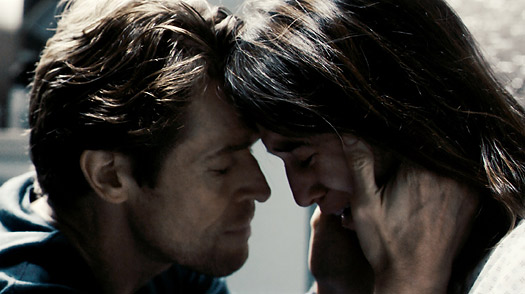
Willem Dafoe and Charlotte Gainsbourg in a still from "Antichrist"
The movie's first title card reads: "Lars von Trier." And the second: "Antichrist." It's almost the Danish director's job description, for he revels in his carefully honed reputation as the nutcake in the buffet of international cinema. So leave it to von Trier to slap a somnolent Cannes festival to life — in fact, to smack it silly. (See TIME's photos from the red carpet at Cannes)
Starring Willem Dafoe and Charlotte Gainsbourg, and filmed in Germany by von Trier's longtime cinematographer Anthony Dod Mantle (Oscar winner for Slumdog Millionaire), Antichrist was greeted at Sunday evening's critics' screening with some appreciative applause and rather more vigorous boos, and gave plenty of ammunition to both sides. Yet you can say something about the 53-year-old auteur that couldn't be applied to everyone with films in the competition: he's a real moviemaker, a composer of rich imagery as evocative as it is provocative, a master matador at waving a red cape in front of the most jaded viewers and getting them to charge.
A quarter-century after his debut feature, The Element of Crime, won the Technical Prize at Cannes — and after showing Europa/Zentropa (Jury Prize, or third place) in 1991, Breaking the Waves (Grand Jury Prize, or second place) in 1996, and Dancer in the Dark (finally, the Palme d'Or) in 2000 — von Trier presents his eighth film in the competition. Antichrist is both his most familiar film — a horror film of a soul gone mad, as in Psycho and The Shining — and one of his most transgressive, which is reviewer's jargon for gross-out gruesome.
Among the effects you won't see in Star Trek (the sensitive reader may wish to skip the rest of this paragraph, or story): a brief glimpse of sexual penetration, the whacking of an erect penis by a plank, the snipping off of a clitoris, in surgical closeup, and the boring of a hole through a man's leg, to which a heavy grinding wheel is attached. (Though the lead actors gave their all to the movie, the closing credits list stunt doubles, body doubles and special-effects artists.)
The trailer for the film, put online earlier this year, stoked fears in von Trier fans of a mainstream sell-out; it "makes it seem, quite shockingly, like an uninspired piece of genre hackwork," wrote Xan Brooks on the Guardian blog. "Surely, that can't possibly be true." It's not. As von Trier has said in an interview with Knud Romer, he wrote Antichrist when he was bedridden by depression, and "I let the film flow to me instead of thinking it up... And because some of the material comes from my youth, it may be unreasonable, ecstatic." If even von Trier calls his film unreasonable, you can be sure it's not ordinary. (See TIME's top 10 movies of 2008)
The movie does establishes a standard scenario for a psychological thriller: a therapist (Willem Dafoe) attempts to help his grieving wife recover from the death of their two-year-old son by taking her to the isolated cabin in a Washington state forest called Eden, where she had spent the previous summer with the boy while writing a thesis, never completed, on the medieval persecution of women as witches. From the midpoint on, as the director's plot summary tactfully puts it, "things go from bad to worse." Worse than you, or almost anyone but von Trier, could imagine.
Weird Witchcraft
Antichrist begins in domestic rapture. In pristine black-and-white images rendered in slo-mo, and to a soprano's lofty rendition of Handel's Lascia ch'io pianga ("Leave me to weep over my cruel fate"), a couple makes love on a snowy evening. In another room the washing machine churns. In a third, the couple's son Nic escapes his crib to, and goes to a window ledge where he teeters, then falls to his death. The sex act, Nic's life and the wash conclude simultaneously. The child's last moment has a beauty to match its horror: as he lands there's the splash of a white aura; he's become an instant snow angel.